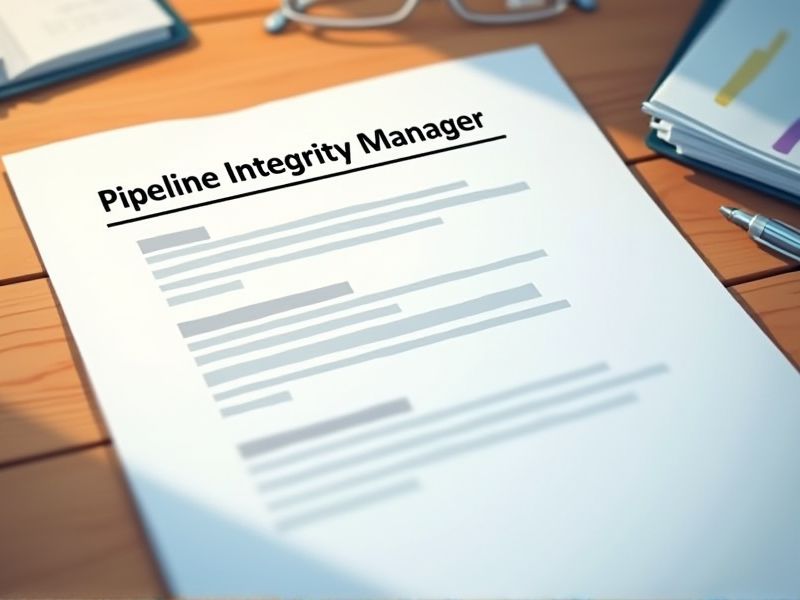
Pipeline Integrity Managers play a crucial role in ensuring the safe and efficient transport of resources through pipelines. Regulatory compliance and safety standards necessitate that individuals in this position possess specialized knowledge and validated skills. Certain certifications provide the necessary expertise and credibility to manage and assess pipeline risks effectively. Here are some important certifications you may need as a Pipeline Integrity Manager.
API 1169 Pipeline Construction Inspector Certification
The API 1169 Pipeline Construction Inspector Certification ensures that a Pipeline Integrity Manager possesses a comprehensive understanding of pipeline construction standards and practices. Recognizing industry standards helps managers identify and mitigate risks that could compromise pipeline safety. Having this certification indicates proficiency in regulatory compliance, which is a key responsibility of any Pipeline Integrity Manager. The certified knowledge enhances the ability to oversee construction projects with precision, reducing the probability of operational failures.
API 570 Piping Inspector Certification
Possessing API 570 Piping Inspector Certification equips a Pipeline Integrity Manager with the ability to assess pipeline conditions accurately, ensuring critical safety and operational standards. The certification builds a structured understanding of industry codes and practices, vital for managing the complexities of pipeline maintenance and inspection. This expertise helps in identifying potential defects or areas of concern before they develop into significant issues, thereby reducing downtime and repair costs. Organizations benefit from employing certified professionals, as they contribute to enhanced safety compliance and improve overall system reliability.
API 653 Aboveground Storage Tank Inspector Certification
API 653 certification ensures that a Pipeline Integrity Manager possesses the necessary knowledge for the inspection, repair, alteration, and reconstruction of aboveground storage tanks. This expertise directly impacts the safety and reliability of storage tanks connected to pipeline systems. Industry standards require compliance with regulations and guidelines, which API 653 certification confirms. Possessing this certification can reduce the risk of tank failures and environmental hazards associated with pipeline operations.
NACE Coating Inspector Certification (CIC)
The NACE Coating Inspector Certification (CIC) equips a Pipeline Integrity Manager with essential skills to ensure the protective coatings on pipelines are applied and maintained correctly, thereby reducing the risk of corrosion. By understanding coating specifications and inspection techniques, the manager can effectively oversee and verify that contractors and workers adhere to industry standards, ensuring long-term pipeline integrity. Properly maintained coatings can significantly prolong pipeline lifespan, consequently decreasing repair and replacement costs. Certification also demonstrates a commitment to safety and quality, reinforcing the manager's credibility in the field.
NACE Cathodic Protection Certification
The NACE Cathodic Protection Certification is essential for a Pipeline Integrity Manager as it provides in-depth knowledge of corrosion control methods, crucial for maintaining pipeline longevity. Possessing this certification ensures the manager can implement industry-standard practices, reducing the risk of pipeline failures due to corrosion. It also enhances the manager's ability to develop comprehensive maintenance and inspection strategies that adhere to international safety regulations. Employers value this certification as it signifies a commitment to maintaining pipeline integrity and safety.
Certified Corrosion Specialist (CCS)
A Certified Corrosion Specialist (CCS) plays a critical role in ensuring pipeline integrity by providing expert analysis on the chemical processes that lead to material degradation. The presence of a CCS helps in implementing effective corrosion prevention strategies, reducing the risk of pipeline failures. By applying their specialized knowledge, a CCS can extend the lifespan of pipeline infrastructure, resulting in significant cost savings on repairs and maintenance. With their expertise, a CCS also ensures compliance with industry regulations and safety standards, which is essential for minimizing environmental and safety risks.
Certified Pipeline Integrity Engineer (CPIE)
A Certified Pipeline Integrity Engineer (CPIE) provides specialized knowledge essential for maintaining the safe and efficient operation of pipeline systems. This expertise reduces the likelihood of pipeline failures, which can lead to environmental damage and costly downtime. Robust strategies for risk assessment and integrity management are enhanced with a CPIE's skills. Regulatory compliance is streamlined as the CPIE ensures adherence to industry standards and best practices.
Certified Reliability Engineer (CRE)
A Certified Reliability Engineer (CRE) possesses advanced knowledge of reliability and risk management, essential for predicting and mitigating pipeline failures. CRE expertise in statistical analysis helps in data-driven decision-making for maintenance strategies, enhancing pipeline safety and efficiency. Their proficiency in designing risk assessment processes ensures consistent monitoring and evaluation of pipeline integrity. Employing a CRE minimizes costly downtimes and environmental hazards, directly benefiting the sustainability of pipeline operations.
Project Management Professional (PMP)
Having a Project Management Professional (PMP) certification equips a Pipeline Integrity Manager with structured project planning and execution skills, crucial for coordinating complex pipeline maintenance and safety tasks. Statistical data highlights that projects managed by certified professionals have a 59% success rate, compared to 46% for those without. PMP certification includes risk management training, essential for identifying and mitigating potential pipeline failures and environmental impacts. Effective communication facilitated by PMP training ensures clear stakeholder engagement, vital for maintaining regulatory compliance and securing continuous pipeline operations.
Certified Safety Professional (CSP)
Having a Certified Safety Professional (CSP) enhances a Pipeline Integrity Manager's ability to identify and mitigate potential hazards, reducing the risk of accidents. CSP credentials demonstrate a comprehensive understanding of safety principles and regulations, which is crucial in maintaining pipeline security and compliance. With the complex nature of pipeline systems and the high stakes involved, a CSP ensures that safety protocols are effectively implemented and adhered to. This certification also underscores a commitment to continuous improvement and professional development in managing pipeline safety.
Summary
When you earn certifications as a Pipeline Integrity Manager, your expertise and credibility in managing pipeline integrity are significantly enhanced. These certifications can lead to improved decision-making and risk management, ensuring smoother operations. Your team benefits from increased confidence and efficiency, reducing the likelihood of operational disruptions. Employers might also recognize your value, which could result in better career opportunities and advancements.
